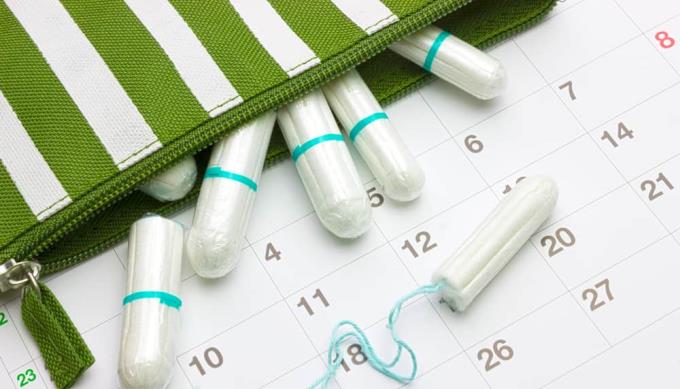Complete template of the whole vascular system in the body

After a series of medical measures they obtained a complete human vascular system profile.
Women often have many questions about the menstrual cycle after giving birth such as when the "red light" will come back, does the "red light" more or less have any effect? ... Let aFamilyToday Health answer the questions. follow up.
Pregnancy is the period when your period stops working. This makes many women feel comfortable. However, many mothers will probably wonder: "How soon after giving birth will my period return?". There are many reasons to think about this. In particular, taking care of the baby with unpleasant symptoms during menstruation will make many mothers bored. Besides, the sex issue also makes many people concerned. Is it safe to have sex when the menstrual cycle has not yet appeared? When should I implement contraception ?
If you exclusively breastfeed your baby , you will usually have a later period, about 7-8 months after giving birth. It is difficult to pinpoint exactly when a period will begin to appear in women after giving birth and who are breastfeeding. You can have a period after the first 2-3 months, but it is also possible that from 8-10 months after giving birth, your period will recover. This is completely normal.
If you're exclusively breastfeeding, your period won't return until your baby shows signs of stopping. For example, your baby may start sleeping longer at night or feed less and begin to learn to eat. If you see this sign, the "red light" will visit you shortly.
When the baby starts to learn to eat, he will divide the time between breastfeeding and eating. That means the number of feedings will decrease. This is a signal that your period will resume.
While breastfeeding, you may bleed for a few days, then stop. This is normal and does not mean your period has recovered.
If you do not breastfeed, your period will recover as soon as 12 weeks after birth.
Menstrual times will return to postpartum fluctuations and vary widely. However, there is one feature of the same postpartum recurrent menstrual period. Here are some noticeable changes in the first menstrual cycle after birth.
After giving birth, many women often experience it is bleeding. This is just normal fluid and will disappear gradually. For many women, this can be the return of a period. This stage will happen soon after birth and you are still in hospital.
Menstrual blood during the first menstrual cycle is usually dark red and has more bleeding than usual. You should remember to change sanitary napkins every 4 hours. If the bleeding is heavy, you will need to change the tampon more often. If you feel insecure, see your doctor to have it checked.
Most menstrual periods first after birth last about a week or more. However, if you have a longer period, don't worry too much. When you feel insecure or uncomfortable, see your doctor to have it checked.

Usually, if you are breastfeeding and your period reappears, you will choose to be more manageable than tampons. However, tampons are not recommended during this period. Instead, you should opt for tampons.
The tampon prevents blood flow, making it easy for bacteria to grow.
Your body just went through a major event while giving birth. As a result, the body's immune system is quite weak and susceptible to infection.
Growing bacteria causes many different complications.
If you feel uncomfortable using regular tampons , you can switch to a tampon intended for pregnant women. These tampons are usually thicker and make you feel more comfortable than regular tampons.
You will feel more anxious when your period occurs while breastfeeding. You may also panic if you notice changes such as the color of the blood (too red, pink, or brown) or if the bleeding is too much. Most of these symptoms are normal. However, there are some symptoms that you should visit the hospital for immediate examination:
The blood is bright red and lasts more than a week.
Sometimes you see blood clots after giving birth. This is completely normal. However, if the clot is too large or lasts too long, see your doctor.
If the blood changes from magenta to another color but suddenly turns magenta.
Normally, menstrual blood will smell bad, but if the smell is too strong, you should consult your doctor immediately.
If you experience pain in your uterus or surrounding areas, tell your doctor right away.
The first 6 weeks after giving birth, you won't ovulate, so there's a low chance of getting pregnant. You should see your doctor regularly during this time. Your doctor will tell you about issues related to safe sex . Here are a few things to keep in mind:
When breastfeeding, the body releases the hormone prolactin. This hormone will temporarily prevent ovulation from occurring.
It is difficult to pinpoint exactly when you will start ovulating again. As long as you are exclusively breastfeeding, your body will not ovulate. Once your baby shows signs of stopping feeding, your body starts releasing eggs again. Sometimes, ovulation doesn't start even if you've stopped breastfeeding.
Menstruation does not mean that you are not breastfeeding. Breast milk does not feel sour, does not change taste when you have your period.
Do you worry that your breast milk will no longer be nutritious during your period? This is not true because breast milk is as nutritious as before. It is important that the longer you breastfeed, the more nutrients your baby will receive.
In addition, if your period returns, your milk production will decrease. You will find that your baby is hungry faster than before. Usually, milk production decreases in the days before menstruation starts or during the first few days of menstruation. If you are in this situation, there is nothing to worry about. This change is only temporary and only occurs during the first few days of your menstrual cycle. The reason for the change is because your hormones change as your period hits.
When the menstrual cycle returns to normal, the hormones will also stabilize. This also causes breast milk to change. You will notice that your milk production increases again. To avoid starvation due to low milk production during menstrual days, you can feed your baby more times.
Before your period, your baby will notice very small changes in the taste of breast milk. Your baby will warn you of this by refusing to latch or otherwise. Babies are sensitive to change but will quickly adapt to new flavors.

Everyone's body condition is different, so postpartum changes aren't the same. However, the biggest impact when you breastfeed is your menstrual cycle. If you are still not sure about breastfeeding, please follow the following shares:
You will be exclusively breastfed for the first 6 months after birth and do not give your baby any other fluids during this time.
You will breastfeed your baby in a way that both mother and baby feel most comfortable with.
You should not let your baby suck on a pacifier while you are breastfeeding.
While breastfeeding overnight, you should sleep with your baby.
During the day, you should sleep with your baby while napping.
You feed your baby day or night when your baby is hungry and don't set a schedule.
Watch carefully to find out if there is anything that makes your baby uncomfortable while feeding.
Most mothers who exclusively breastfeed their babies have their period again after 14-16 weeks after birth. Mothers who do not breastfeed are still likely to delay their menstrual cycle recovery, but will not appear too late.
So it is clear how soon after giving birth your period will return. Remember that everyone's body is different, so what you experience will be completely different from everyone else. So, try to keep your best mood. If anything is unusual, see your doctor right away.
After a series of medical measures they obtained a complete human vascular system profile.
Watermelon is one of the fruits that many people love, not only cheap but also delicious, nutritious and refreshing in the summer. To get delicious watermelon pieces, show off your housewives, your artistic talents to cut beautiful pieces of watermelon.
The dog is an animal that is close to humans, it is also the first animal that humans were purebred, about 15,000 years ago at the end of the Ice Age.
aFamilyToday Health - The digestive system and body in each baby is different. Parents need to recognize notes to deal with when babies have a food allergy!
Babies need many factors for perfect development. aFamilyToday Health shares with parents things to keep in mind when babies are 8 weeks old so that parents can take care of their babies the best!
Babies need many factors for perfect development. aFamilyToday Health shares with parents things to keep in mind when babies are 18 weeks so that parents can take care of their babies the best!
Babies need many factors for perfect development. aFamilyToday Health shares with parents things to keep in mind when babies are 28 weeks old so that parents can take care of their babies the best!
Babies need many factors for perfect development. aFamilyToday Health shares with parents things to keep in mind when babies are 32 weeks old so that parents can take care of their babies the best!
aFamilyToday Health provides basic knowledge about 3 popular formula milk types, helping you to choose the right milk for your baby's needs.
In addition to giving babies the opportunity to enjoy valuable nutrition, what other interesting benefits can breastfeeding mothers enjoy?








